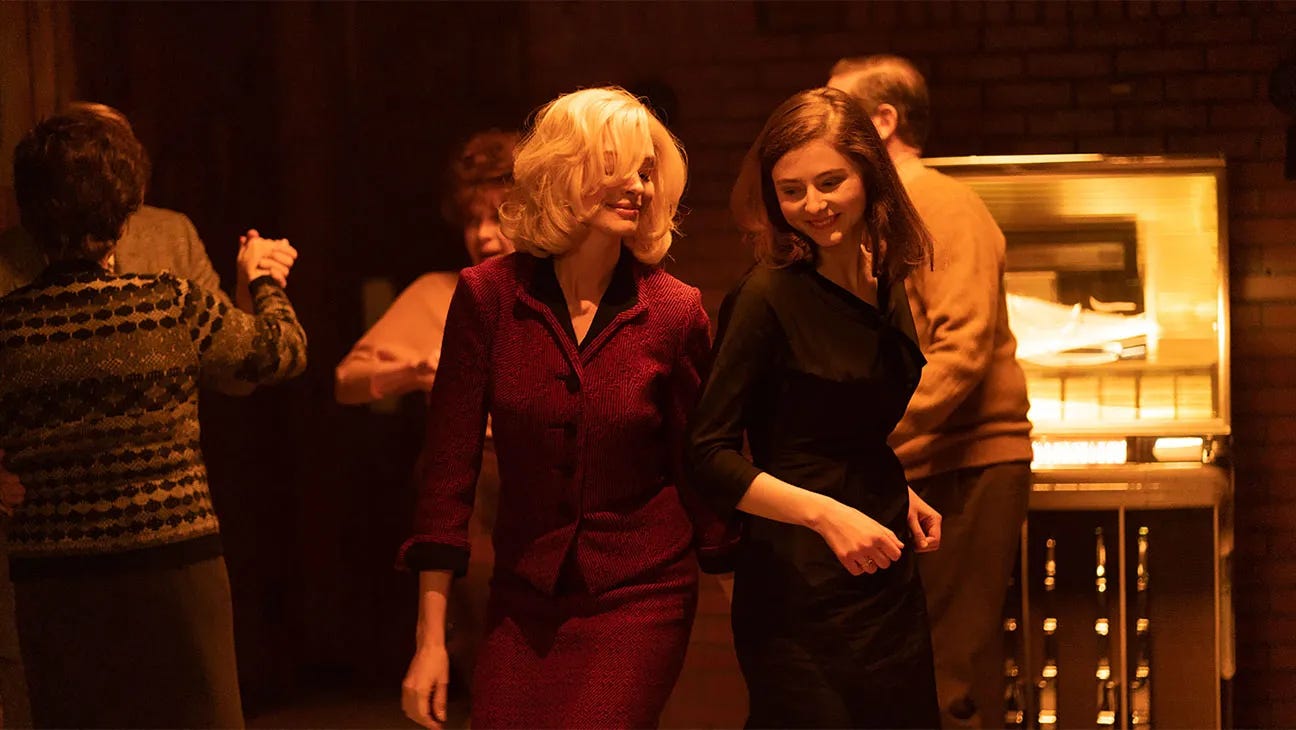In Review: 'May December,' 'Eileen'
Ambiguous and shifting relationships are at the heart of two otherwise strikingly different new movies by Todd Haynes and William Oldroyd.
May December
Dir. Todd Haynes
117 min.
When Elizabeth (Natalie Portman, never better) arrives at the Georgia home of Gracie (Julianne Moore) and her husband Joe (Charles Melton) during a backyard barbecue, she notices a package on the front porch and takes it to the hosts. As soon as they spot the box, they have a pretty good idea of what’s inside, confirmed when they open it and it contains feces. Gracie and Joe are pretty nonchalant about it all. This has happened before and, thankfully, it doesn’t happen nearly as much as it used to. Gracie and Joe are now two decades past the prime of their tabloid notoriety, when their relationship came to light in dramatic fashion, as happens when a middle-aged woman is caught sleeping with her seventh-grade pet store co-worker. That unwanted package is, on the surface at least, the only sign there’s anything particularly unusual about Joe and Gracie’s relationship. But it’s not a particularly thick surface.
Inspired by the life of Mary Kay Letourneau and others like her, the latest from Todd Haynes (working from a script by Samy Burch and a story by Burch and Alex Mechanix) is both a study of what happens in such a relationship after the spotlight moves elsewhere and a study of the process of trying to understand it. A TV star who smiles reflexively whenever she encounters one of the many fans of her show Norah’s Ark, Elizabeth sees playing Gracie as a chance to prove herself capable of more challenging work. She throws herself into the task, spending time with Gracie and Joe, interviewing those who know them then, and revisiting spots key to their relationship. It’s a process of diligent preparation that takes on an almost vampiric quality at times. The scene where Elizabets visits the pet store stockroom where the relationship began recalls the basement scene in Zodiac, only this time it’s the visitor who seems potentially monstrous.
Repeating and creating variations on a Michel Legrand theme written for the 1971 film The Go-Between, Marcelo Zarvos’ score sets an unsettling, irresolute tone perfectly in sync with a film that refuses to give its viewers any sure footing on which to stand. The more time Elizabeth spends with Gracie, Joe and those who know them, the blurrier the details of their lives together becomes. The facts of their affair are simple and undisputed, but what led to it and what came of it is another matter. In public, Gracie’s careful watch on Joe’s beer consumption suggests a relationship more maternal than matrimonial. In private, she breaks down in her husband’s arms. Their children—one in college, the others about to graduate from high school—see them in a different light altogether, with a mix of resentment and sympathy born of having spent their lives dealing with their origin story and only now getting enough distance to consider its oddness.
Moore (always great but seldom better than when working with Haynes) and Melton (revealing skills largely unseen on Riverdale) play their characters with depth and complexity but never dissipate the murk surrounding their relationship. Joe grows restless, but it’s never clear if this is born of regret or a changing sense of self. Nor is it clear whether Gracie’s fragility predates her infamy or was born of it.
The film has no interest in providing answers. Haynes knows how movies usually treat this sort of story. (We even get a clip of a decades-old made-for-TV melodrama.) Sometimes May December acknowledges and tweaks this, as an early moment in which a potential hot dog shortage gets a dramatic sting. But the film’s deep interest in ambiguity and unknowability is closer in tone to Safe. In one of May December’s best scenes, Gracie offers Elizabeth a tutorial on how she puts on her makeup. Haynes shoots the film in a double close-up and the resemblance between the two becomes uncanny. But there’s a distance to the moment, too. Intimacy isn’t the same as understanding. Some stories just get cloudier as they’re told. —Keith Phipps
May December is playing in select theaters and debuts on Netflix tomorrow.
Eileen
Dir. William Oldroyd
98 min.
To those who aren’t paying close attention—which is to say, everyone in her immediate orbit—Eileen Dunlop is a drab sheet of wallpaper, a mousy nobody in 1960s Boston who tends to her alcoholic, ex-cop father while logging time at juvenile detention facility for boys. Her aberrant behavior is like a secret shared only with the audience in Eileen, a peculiar and insinuating psychological thriller that reveals her as a hothouse flower who needs a little sunlight to open up a malevolent bloom. That comes later, when another woman sees what we see, but until then, the film is a fascinating study of sublimated desire, as Eileen entertains perverse fantasies that her life, to that point, seems incapable of making flesh. Then everything changes.
With Thomasin McKenzie in the title role, Eileen feels like an accidental companion to her performance in Edgar Wright’s Last Night in Soho, another film about a shy, obsessive young woman who’s transported into a noir-inflected world of eroticism and violence. Though her New England accent here seems more than a bit overdetermined, McKenzie does a lot of great work with her eyes, which tell a lot more of the story than anything she has to say. Eileen is based on the novel by Ottessa Moshfegh, who scripted with her husband Luke Goebel, and it feels like a film that has to lean on its lead character’s expressions to carry across internal dynamics more naturally conveyed on paper. Between McKenzie’s face and director William Oldroyd’s occasional glimpses into his heroine’s headspace, Eileen makes the private impressively tangible.
With her father Jim (Shea Whigham) a washout at home, where he lives in squalor while assaulting his liver and waving his pistol around, Eileen’s bleak workplace becomes an odd escape, despite the drudgery of patting down mothers on visitation days or hauling out the trash. She gives long looks to a particularly lithe and handsome inmate in the yard, despite his booking for stabbing his father to death, and does likewise with a young guard when he’s turned away. When Rebecca (Anne Hathaway), a glamorous new counselor, joins the staff, however, the two have a “Carol” moment when they acknowledge each other and something tangible and dangerous develops between them. But there are more forbidden things at play here than just love.
McKenzie and Hathaway are both a bit too mannered in their performances, as if they’re straining to play to a certain period cinematic type, but their chemistry is real. As the more seasoned and aggressive of the two, Rebecca seems to be the person driving their relationship, but she doesn’t know Eileen any more than Eileen seems to know herself. The unusual circumstances reveal her capabilities as a person, which makes Eileen most exciting as a human mystery rather than a genre exercise. It only takes a few small twists of the plot to get the film going and the rest is up to the imaginations, desires, and shady morality of two women to lead us down a dark little path. — Scott Tobias
Eileen opens in limited release tomorrow.









I really loved May December. All the top performances are excellent, but Melton really stands out for being the emotional core of the film. He's already won Supporting Actor at NYFCC and that's probably not going to be his last win.
I also find the end reveal of the film Elizabeth is working on to be a great punchline.
"She gives long looks to a particularly lithe and handsome inmate in the yard, despite his booking for stabbing his father to death"
"Despite", Scott? seems like she might think killing a father is an attractive quality in a young man.....